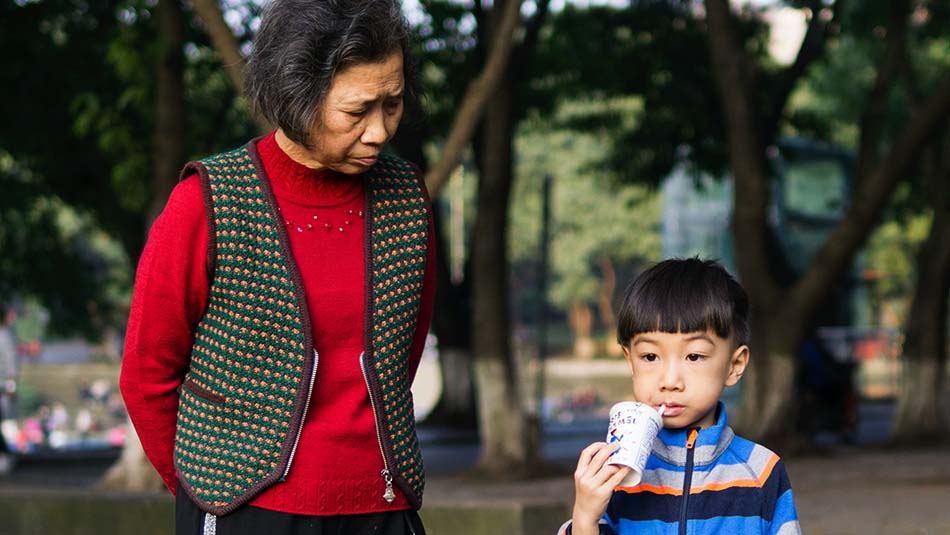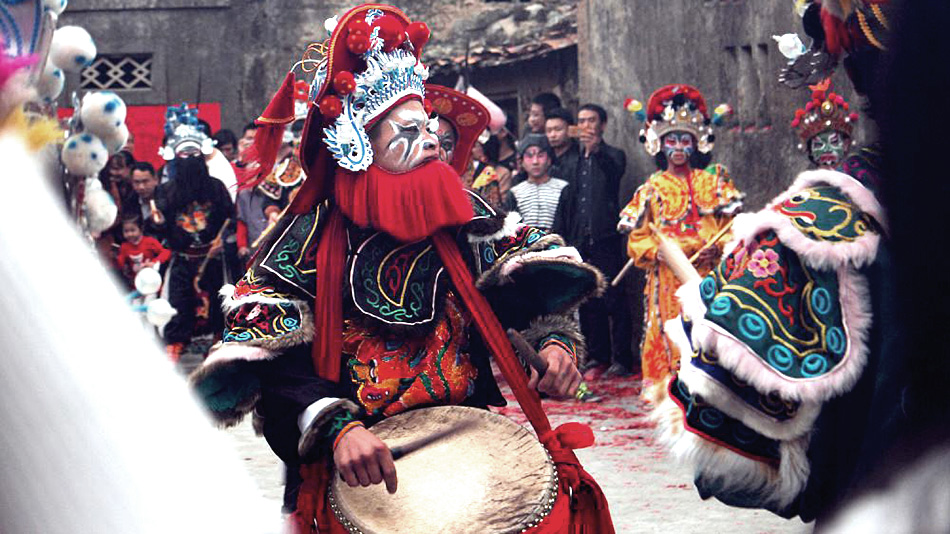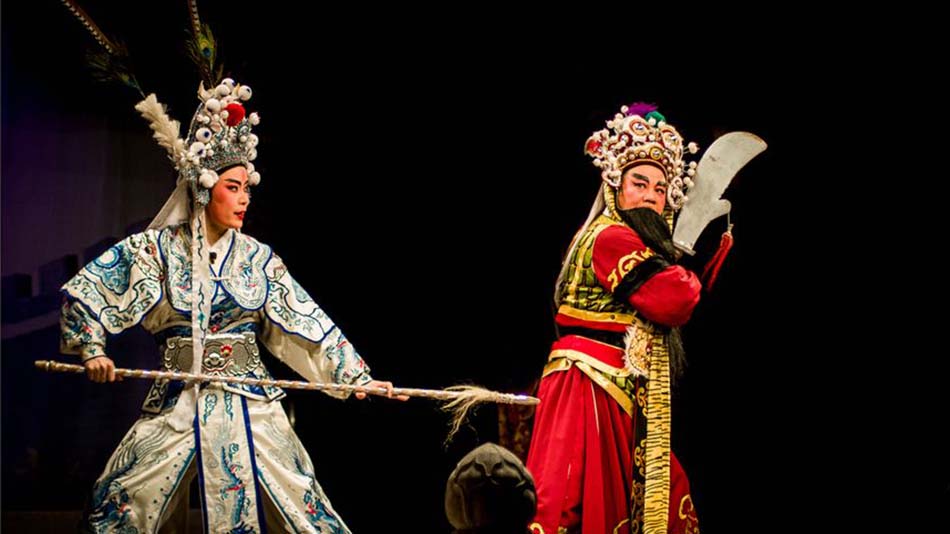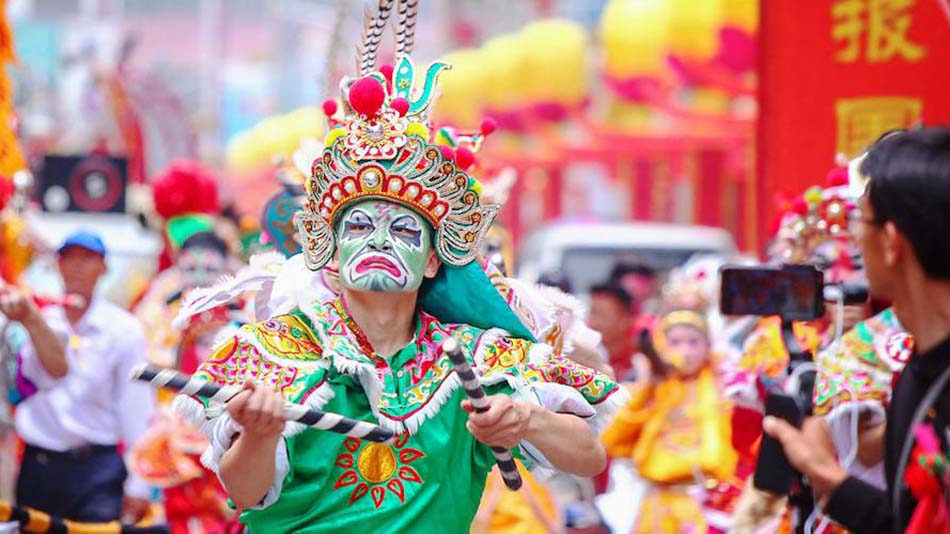As more young generation do not speak the dialect, how does the city deal with the language crisis?
It is Mid-Autumn Festival night. Rows of red lanterns with riddles written on them are hanging on a wooden shelf in the village square. A hand shoots up in the assembled audience as one of the crowds indicates they are ready with an answer.
The man sitting on the stage beats the drum eight times to let everyone know he has answered correctly. The contestant races to the front to collect his prize – a bag of sugar – as the audience gives him a round of applause.
But this event is much more than a social quiz, according to the drummer and lantern riddle master Shuomin, who has been running the lantern ceremony for 20 years. He sees this as a vital way to preserve the local dialect Teochew and the culture that goes with it.

“More young people do not speak Teochew nowadays, which brings a crisis to our language,” says Shuomin, aged 50. “Chaozhou lantern riddles encompass a wide range of topics and content, making them an effective carrier for the local dialect.”
He remembers winning his own bag of sugar in the lantern riddle competition as a little boy. “I really enjoyed the feeling of being respected by the audience after I gave the right answer,” says Shuomin.
Now it’s about much more than a bag of sugar… his passion is the preservation of the dialect he grew up speaking.
Shuomin was born and grew up in Chaozhou, a city located in the South of China. People in this city have their own dialect – Teochew. Growing up in a city with a unique language and culture, he developed a passion for the dialect and Chaozhou lantern riddles when he was little.
It was interesting that you can learn the dialect as well as the culture through the process of guessing the lantern riddles
Shuomin,
now an expert on lantern riddles.

However, the dialect, which is described as a living fossil of the ancient Chinese language, is now facing a crisis of inheritance. According to Shuomin, the language gap between the younger and older generations has become more significant.
Desen Liu, 78, born in Chaozhou and only speaks the dialect, just moved to Chengdu to live with his son. His grandson, Chengjun Liu, who grew up in Chengdu, speaks fluent Mandarin and Sichuanese but does not speak his native dialect. Whenever Desen speaks to his grandson in Teochew, this young person looks puzzled and does not understand what he is saying. In times like these, his son becomes the interpreter.
For most elderly from the city, the only language they speak is Teochew. However, most young people cannot speak the dialect fluently or even do not speak the dialect.

One of the reasons for the language gap is that more people have been out to work or study since China’s reform and opening up, and their children have become the first generation that cannot speak Teochew due to the lack of exposure to the dialect.
“Teochew is actually easy to learn if you are exposed to it regularly and are in that cultural atmosphere. But nowadays more young people are working and studying away from home and are less exposed to the dialect. Therefore, the language gap between the two generations is becoming bigger,” says Shuomin.

Another reason for the language gap is that people do not pay enough attention to dialect inheritance.
“When my grandfather speaks Teochew, I totally had no idea what he was talking about,” says Chengjun, “Because the language sounds completely different from Mandarin. My parents do not teach me the dialect. In my family, we only speak Mandarin to each other.”
Despite the fact that the language gap has become a prominent problem in some families, most parents still do not realise the importance of teaching their children some Teochew and keeping the dialect alive.
“Passing on the dialect is also a matter of attitude. It is the parent’s responsibility to teach their children the dialect of their hometown. In a family, if the elders always encourage the younger generation to speak Mandarin instead of Teochew, it can create a kind of language crisis,” says Shuomin. He emphasised that some people attach less importance to their local culture and lack a sense of cultural confidence.

The movement to promote Mandarin is also considered a significant culprit in the loss of local dialects in some Chinese cities. In 2005, the Chinese government started the promotion of Mandarin, the slogan “Please speak Mandarin” can be found in many public places, especially in schools. Students and teachers were required to speak Mandarin instead of their local dialect.
“The movement to promote Mandarin is one of the reasons for the difficulty of passing on the dialect, as it is to some extent incompatible with the inheritance of Teochew,” says Shuomin.
Students are required to speak Mandarin in school at the age when they are most able to learn languages. According to Shuomin, this creates an awkward and strange phenomenon among young people. They often speak in dialect interspersed with some Mandarin because they have no idea how to express some phrases in Teochew.

Although Teochew is facing a crisis of inheritance, people like Shuomin, who love the dialect and culture of their hometown, are not giving up.
I hope that through the promotion of the Teochew Songs, more young people will not only learn Teochew but also know how to speak it.
Zhenkai Ying,
an expert on Teochew songs
He is a friend of Shuomin and an expert on Teochew songs. He has been working on collecting the Teochew songs for over 50 years and has compiled them into a book.
To encourage more young people to get involved in learning the dialect, the local government has also invested lots of effort. And schools across the city have become major venues for promoting the dialect and local culture.
These courses were designed to enable students to understand and appreciate the Teochew and experience the charm of the development of Chaozhou’s excellent traditional culture in a subtle way.
Peizhu Cai,
a teacher at a primary school in Chaozhou.
The primary school where Peizhu works is one of the schools that conducts the traditional Chaozhou culture programme in the city. The school has been offering Teochew courses and Chaozhou songs courses for students since 2021.

As well as promoting the dialect and culture in schools, the government has sent out Chaozhou Opera Association to perform in Southeast Asian countries, where there are many Chaozhou immigrants.
Besides, radio broadcasting has become a channel to promote the city’s dialect and culture to overseas compatriots. In September 2019, China’s first radio station in the Greater Bay Area, FM101.2 of the China Central Radio and Television Station, was launched. And Teochew became one of the five broadcasting languages used by this radio station.
“The government has invested a lot of effort in saving and promoting the local culture and language over the last few years”, says Shuomin, “If we do not pass on the Teochew and Chaozhou culture, our dialect and culture will face a crisis of gradually disappearing. Once cultures and languages have disappeared, it will be very difficult to start again from scratch.”
As a man with a great love for his native culture and dialect, Shuomin believes that the prerequisite for learning Teochew well is that young people should have a sense of identity with the local culture. “It is important that our children love and appreciate the language and culture,” says Shuomin.

Teochew is not the only Chines dialect that is facing a crisis. In the course of China’s modernisation, policies such as the Mandarin movement have led to the situation of the disappearance of many local dialects.
Driving his truck, carrying some lanterns with riddles on them, Shuomin is off to another lantern riddle ceremony. He knows that his power alone is small, but within him, the belief in passing on the dialect is strong and has kept him going.
“Dialects are carriers of our local culture. By learning and passing on the dialect, we save and develop our culture. I wish to encourage more of our young generation to learn Teochew,” says Shuomin.
